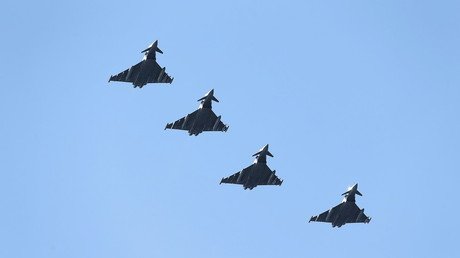UK needs to be “more aggressive” in countering cyber threats, intel chief warns

The UK needs to be “more aggressive and take risks” in order to counter emerging threats, the head of the UK’s military intelligence will warn later today.
Extracts of a speech to be delivered by Air Marshal Phil Osborn to the Royal United Services Institute (RUSI) on Friday, seen by The Times, warn that the risk of an attack with “very sophisticated” chemical weapons is also growing.
He will add that utilities such as power stations and water supplies, as well as other parts of critical national infrastructure, are under threat from new, advanced missiles.
Describing a “world that is more dangerous, uncertain and unpredictable,” Osborn, who is the chief of defense intelligence, says the UK needs to be “much more aggressive and to take risks.” He will say that this could include launching pre-emptive cyber-attacks.
While this would not go as far as what The Times penned as the agency “launching its own Russian-style disinformation” campaign, British hackers would become “better at countering the false messages that are pumped out on Twitter, Facebook and other media platforms.”
In 2016, the UK Ministry of Defense said it would make £40 million ($54 million) available for a new cyber-defense operations center to improve its protection from digital attacks. According to the ministry, the center, based out of Corsham, will utilize “state-of-the-art defensive cyber capabilities to protect the MoD’s cyber space from malicious actors.”
Referencing the nerve agent attack against former Soviet double-agent Sergei Skripal and his daughter Yulia in Salisbury last March, Osborn’s speech adds that the risk from “chemical weapons, some very sophisticated, is on the rise.”
In March, a further £48 million ($65 million) was awarded in fresh funding to set up a chemical weapons defense center under the umbrella of the Porton Down military research establishment, despite reports that the ministry faces a funding shortfall of between £5 billion ($6.7 billion) and £21 billion ($28.3 billion).
Missile development in “hostile states” such as Russia, North Korea and Iran is also a cause for concern, according to Osborn. The spymaster will warn that ongoing missile developments have the potential to put our “critically important national infrastructure at risk,” as well as “increasingly challenge our ability to base and resupply deployed forces.”
Warning that modern warfare is multi-layered, Osborn says that “new technologies will change warfare… and our lives and society… without change, we risk quickly falling behind in today’s and tomorrow’s confrontation.”
Like this story? Share it with a friend!















